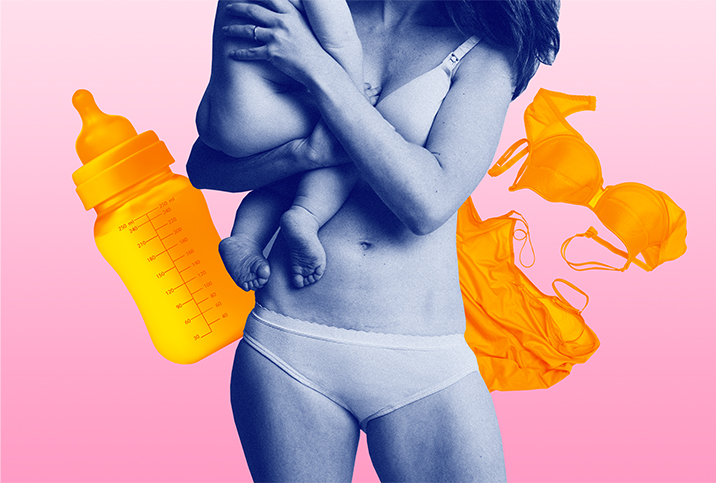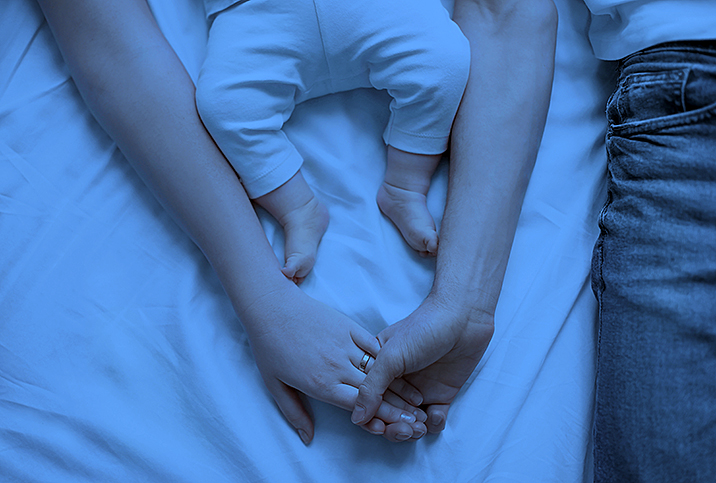Health Professionals Weigh In on Sex After Giving Birth

The idea of having sex after giving birth can seem daunting, but there are measures you can take to make it easier once you are ready.
It is one thing to be physically able, but it is quite another to be mentally and emotionally ready to have sex again.
Danae Maragouthakis, M.P.H., M.S., medical director at Yoxly, a provider of sexual health test kits based in Oxford, England, described the journey back to being sexually active as a personal choice because every labor is unique and everybody heals differently.
The timing is not written in stone
The official recommendations on sex after birth have changed in recent years from the often-cited rule of no vaginal penetration for six weeks, said Hector Chapa, M.D., a board-certified OB-GYN and clinical assistant professor at the Texas A&M University School of Medicine in College Station.
He stated this rule was based more in tradition than in medical science.
"The right time to resume sexual intercourse or vaginal penetration is when the woman is ready," Chapa said.
Naturally, the type of delivery—vaginal or cesarean section—can affect how you heal and your body's ability to be ready for sex.
Maragouthakis said the general advice is to wait four to six weeks after a vaginal birth and six weeks after a C-section. Tearing, whether it occurred naturally or surgically in the case of an episiotomy, which requires stitches, can elongate healing times. Depending on the severity, she said it can take six to 12 weeks to be physically ready for sex.
"As the uterus heals from childbirth, it is particularly prone to infection, so delaying any sexual activity for the minimum of two weeks is advised," Chapa added.
Some complications are possible
Having sex too soon can strain the vaginal tissue, according to Cristin Hackel, R.N.C., M.S.N., a nurse practitioner based in Bethesda, Maryland, and medical provider at Nurx, a reproductive and sexual health brand. In the case of a C-section, she explained the cervix may still be dilated, and the abdomen and pelvis are still recovering from major surgery.
"Allowing the necessary time to heal will decrease the chance of pain or injury during sex," she advised.
More than a third of postpartum women—35.5 percent—were found to have some form of sexual dysfunction in a 2020 Malaysian study. The most common types reported were lubrication disorder (85.6 percent), loss of desire (69.7 percent) and pain disorders (62.9 percent).
When the time for sex comes, Chapa said it's important not to rush and to be gentle. He recommended using lubricant to ease discomfort as low estrogen levels resulting from breastfeeding and the postpartum period can cause vaginal dryness.
"Always listen to your body and take your time," Maragouthakis agreed.
She advised emptying your bladder before sex and taking some paracetamol when it's your first time. If lubricant isn't enough to help dryness, she said it is possible to ask your doctor for a vaginal estrogen cream.
Another consideration after birth is pain during vaginal intercourse, a phenomenon known as postpartum dyspareunia. According to a detailed paper on the subject, "superficial dyspareunia is limited to the vulva or vaginal entrance, while deep dyspareunia means the extension of pain into the deeper parts of the vagina or lower pelvis."
A study published in 2022 in Obstetrics & Gynecology found 12 percent to 62 percent of women experienced dyspareunia at three months postpartum, 17 percent to 45 percent at six months and 8 percent to 32 percent at 12 to 18 months.
Talk to your partner about what you're feeling
Hackel said taking care of a baby can drain the energy needed to desire sex, alongside the baby blues, which can last for several weeks.
Low sex drive after birth can be attributed to factors such as hormonal changes, pain, depression, fatigue, new family dynamics and body image, Maragouthakis explained.
There is also the more serious condition of postnatal depression, which can impact readiness for intercourse.
"Having open conversations with your partner about your mood, energy and desires may help both people ease back into their physical connection," Hackel advised.
Juulia Karlstedt, M.A., Pg.D., an accredited counselor and online therapist at Anxiety Counselling Online, based in Edinburgh, Scotland, said it is important to find space to discuss how far you feel able to go physically and your rules for "disengagement" should either partner change their mind. If, for whatever reason, you are not able to decide at that moment, she suggested agreeing on another time when you may feel ready to answer.
Intimacy is not just about sex, as it is possible to find time for togetherness in lieu of sex.
"A good place to start is to agree to not have sex but instead to simply engage in cuddling and touching that feels good for both of you," Karlstedt recommended.
She offered this advice as a way for both of you to be present in the moment without the added pressure of either one expecting sex.
Don't forget the contraceptives
A vital practical consideration is contraception. The United Kingdom's National Health Service (NHS) advises it is possible to get pregnant three weeks after giving birth, regardless of whether your periods have restarted or if you are exclusively breastfeeding.
Maragouthakis explained that this is the reason it is advisable to use contraception every time you have sex.
"Consider discussing your contraceptive options and make a plan with your doctor in advance," she said.
The NHS further advises that the contraceptive implant and injection, the progestogen-only pill, and male and female condoms can all be used immediately after giving birth.
Depending on your risk factors and whether you are breastfeeding, you can be prescribed the combined pill, vaginal ring or contraceptive patch three to six weeks into the postpartum period. An intrauterine device (IUD) can usually be fitted after four weeks. Childbirth can affect the fit of the diaphragm, so you may need to be checked by your healthcare provider before using it again.
The American College of Obstetrics and Gynecologists (ACOG) advises waiting at least six months after giving birth, with 18 months or more being the optimum interval, before getting pregnant again.
Complications can arise after childbirth, so it is important not to dismiss any troublesome pain, excessive bleeding or any signs of infection.
"If you have any questions, concerns or something that just doesn't feel right, you should always speak with your doctor," Maragouthakis said.


















